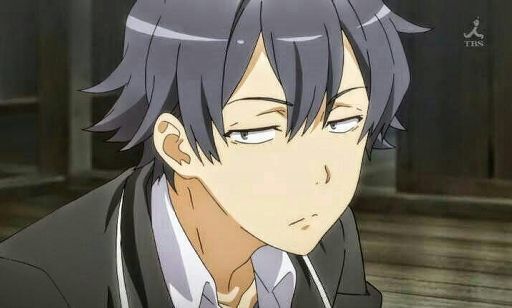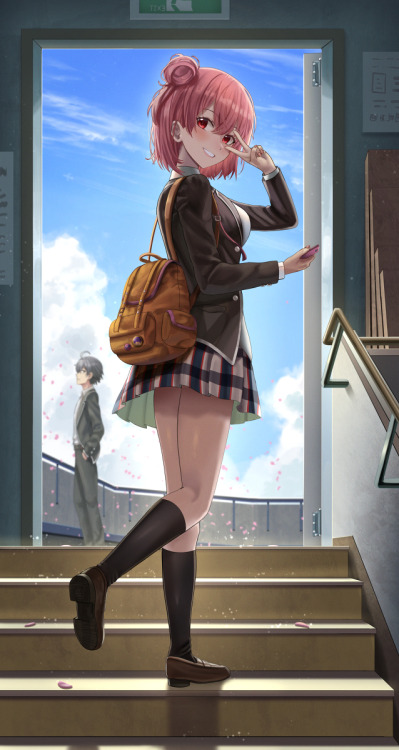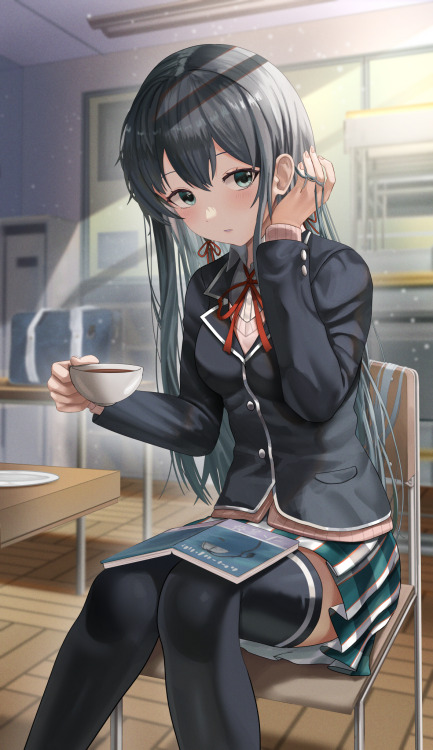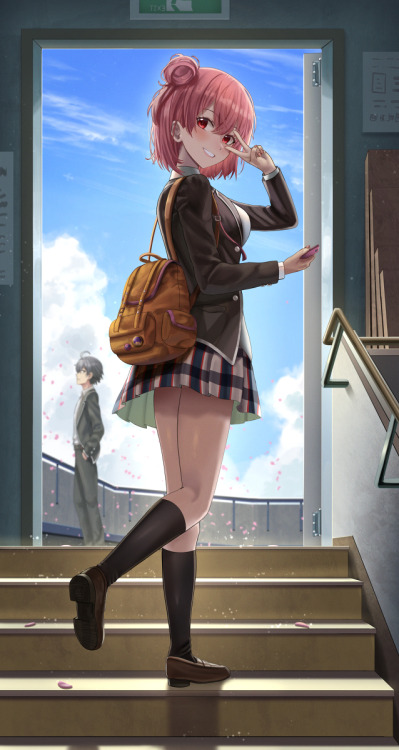#hachiman hikigaya
Dead Fish eye anime characters just built differently




Takuya Eguchi
LOID FORGER / TWILIGHT fromSpy x Family (2022)

DOMASfromRanking of Kings(2021-2022)

KAKERU MANABE fromFruits Basket(2019-2021)

HACHIMAN HIKIGAYA fromMy Teenage Romantic Comedy SNAFU(2013)

SHIBISUfromTower of God(2020)

NERO VANETTIfrom91 Days(2016)

YUJI TERUSHIMA fromHaikyu!!(2014-2020)

★ 【SilverTsuki】 「 yui and hikki // oregairu 」 ☆
✔ republished w/permission
⊳ ⊳ follow me on twitter
Post link
★ 【SilverTsuki】 「 yukino//yui and hikki 」 ☆
⊳yukino // yui and hikki (oregairu)
✔ republished w/permission
⊳ ⊳ follow me on twitter
Post link

My rating: 5 of 5 stars
So, then, where are they going, and how much energy will they expend to get there?
Hikigaya, Yukinoshita, and Yuigahama have found themselves invested in one another to such a precarious extent that when one suffers the perils of an overextended youth, they all suffer. It wasn’t always this way. Three minds. Three hearts. Three intuitions. They each had their own way of experiencing youth, fighting their way through its many thorny tendrils, and escaping with one or two hopes, or presumptions, for the future. But as readers learn through MY YOUTH ROMANTIC COMEDY…#12, the survival of like minds and like hearts begets the convergence of a likewise intuition. The novel focuses on these three teenagers’ increasingly dependent emotional fortitude.
More specifically, the novel focuses on the wayfinding and crossroads of which Yukinoshita must navigate. Yukinoshita has a decision to make. Lots of decisions. Few of which will spell happiness for the intelligent young woman.
Readers already know her family’s social and political prowess as businesspeople, politicians, and community influencers. Readers already know her sister, Haruno, fits into the mold of the marionette so inexplicably well because the woman’s taste for what’s new, changing, and energizing will never be sated. Readers already know Mrs. Yukinoshita, her mother, carries “final boss” level ego to the point at which girlish, youthful independence is viewed so tepidly, the woman treats it no more seriously than a fashion trend or a fad.
Does Yukinoshita wish to follow the family blueprint? Lead the family business with incisive grit? Become a shrewd socialite with a kind smile and a barbed tongue? She can. Absolutely. But it wouldn’t be her decision. It wouldn’t be her path. Even if she succeeded. Even if she applied all of her intelligence and tact, and met everyone’s expectations, the Adult Yukinoshita at the end of that path wouldn’t be legitimate. She wouldn’t be real.
Independence rarely comes easy. And so, Yukinoshita, nearing her final year of high school, has a decision to make. Lots of decisions.
“Dreams, hobbies, clubs, or any of the possibilities that could have been born there would be cleanly melted down to be re-poured into the mold of the adult that society demanded” (p. 147).
MY YOUTH ROMANTIC COMEDY…#12 picks up precisely where the previous volume left off (and, notably, concludes in such a way that the following volume will likely do the same). Yukinoshita seeks emotional support from Hikigaya and Yuigahama. She wants to negotiate the cost of seeking her independence. But she fears the thudding swell of anxiety in her chest is more a harbinger of things to come than the clarion call of an cleansing truth.
Hikigaya understands. He acknowledges the once trivial silences that permeated the relationship between he and Yukinoshita and Yuigahama now carry more weight than he alone can bear.
“The time we’d spent together filled less than a year. Of that time, there’d been lots we’d remembered, more we’d forgotten, and much we’d pretended to forget” (p. 21).
And so, in that one year’s time, they’ve muddled through a wild number of exploits, frustrations, games, stubbed toes, and genuine surprises. But they’re friends now. And friends help friends in need. The question, however, for Hikigaya, is to what extent he’ll venture to hold fast to this new reality to prevent it from spiraling beyond his control. Will he succumb to debating Haruno on the veracity of his interpersonal relationships? Will he set aside the heated nausea roiling in his gut and contrive a plan to rebut the venomous ferocity of Mrs. Yukinoshita’s overzealous parenting?
Admittedly, these are somewhat rhetorical questions. But the novel goes through commendable lengths to show readers why these questions need to be asked as much as what the obvious and nonobvious consequences are for daring to respond to them. Yukino Yukinoshita can make a decision for herself. She can decide her future for herself. That’s not what this is about. The real challenge is whether anyone will support her when she reaches her final threshold. And if that support fatefully arrives, who is to say the preexisting barriers to her independence will yield?
Hikigaya is less focused on but nevertheless mindful of how his dedication to Yukinoshita’s sense of self necessarily overlaps with how he trusts, perceives, and engages the other young women in his life. The boy’s humility is slow-dawning, almost agonizingly so, and his modestly successful bargaining of adolescent pathos feels freshly grievous for how long and raw it grinds on his heart.
In a surprising but serviceable departure from the standard narrative, the author of MY YOUTH ROMANTIC COMEDY…#12 introduces a handful of interludes, intercalary chapters, to showcase Yuigahama’s feelings for Hikigaya. The interludes, however, match the muted tone of the overall novel. In short, they make good on the girl’s dark note in the previous volume: “I’m not as nice as you think I am” (#11, p. 184). On the inside, Yuigahama is not an aster flower, eternally craning her neck to wherever the sun might shine. She’s clever, yes. And she’s resilient, yes. But she’s also exhausted. Interminably exhausted.
Yuigahama weighs the truth and the fear of her affection for Hikigaya with Yukinoshita’s affection for Hikigaya. But again, Yuigahama is a clever and resilient girl. She sees everything. She understands the type of relationship Hikigaya needs, and the sundered reality in which his identity best thrives. Yuigahama also understands, with deeper and deeper sadness, that what Hikigaya seeks is not what she is willing to give up.
Elsewhere, the interlocking uncertainties continue. Iroha Isshiki, the first-year student council president, is as annoying as ever. But beneath the girl’s veneer of caustic ebullience, she chokes out a good idea or two. She’s still “an ultra-cunning devilish imp” (p. 162) and a “bewitching little devil” (p. 184), for how she cajoles other students into helping her throw together a prom-style graduation celebration with only a month left in the school year. But she sobers up and drills into Hikigaya for his long-marinating and increasingly unpleasant Big-Sister turned Madonna-Whore complex. The cutesy and irate little girl aptly matures in real time.
And then there’s little Komachi. Hikigaya-the-younger-sister completes her high-school entrance exams and it’s a mad dash. There’s a lot of bottling up of emotions, a lot of respectful nodding, a lot of pre-made breakfasts and promises of lunch-date celebrations. But in the end, with a hug and some tears, the splinter plot of the entrance exams lend the novel a pleasant breath of fresh air. Hikigaya admits he’s too attached to his kid sister. He knows he has to let her go. But he also knows, in some funny little way, that no matter how much Komachi demands they “wean” themselves off of one another, a bit of support every now and then is a good thing.
MY YOUTH ROMANTIC COMEDY…#12 is a daunting read for way the author has dutifully structured the novel as what may be the rising action of the novel series’ climax and denouement. The book is full of emotional conflict. Unresolved intellectual curiosity. Vague implications of resolution. Simplified assurances of a redoubled conflict. And more.
The prom-style event receives pushback. Will it be canceled? What will happen to the hard work of the student council? Of the Service Club?
Mrs. Yukinoshita is intent on berating Yukinoshita into doing what’s best, even if it’s not in the girl’s personal, best interest. Will the young woman comply? What will happen to all of her hard work?
Yuigahama spies heroism in Hikigaya’s latent, bull-nosed humility. Will she fight for it? She believes she’s fooled others, fooled Hikigaya, into tending to the needs of others, because her own needs have already been met. But what if, in the end, Yuigahama’s merely fooling herself? Alas, this deep and ancient pool of human pathos cares not whose toes tease its temperature.
And what about Haruno’s shame? A woman who is “beautiful, enchanting, with an intoxicating ring to her voice, like it would haunt you till death,” and yet, while “she never does show her true face, but she’ll deliberately show you the cracks in the mask. I still don’t know what her truth is,” Hikigaya muses (p. 56, 58).
Among the unfurling flights of pity readers have discerned within the heart of Yukinoshita-the-elder-sister, from the previous volume to the current, the woman’s sneering attitude toward emotional vulnerability remains at the dreadful vanguard. Haruno Yukinoshita hunts down, strangles into submission, and then gleefully toys with the intuitions of others; she is a marauder of the heart. But why? MY YOUTH ROMANTIC COMEDY…#12 offers a very narrow, but very probable glimpse as to the answer.
When Mrs. Yukinoshita talks down to her youngest daughter, Haruno asserts boredom and chitters away about the inevitability of such things. When Hikigaya proposes dependability in the face of vaunted social pressures, Haruno slaps him down with barking laughter and a snide comment on the frailty of youth. When Yukinoshita says she wants to talk about her future, from square one, Haruno swigs a bottle of champagne and pretends to be drunk, because the honesty of youth in search of independence leaves a bad taste in her mouth (Haruno: “Giving up and letting go is how you become an adult,” p. 54).
Haruno’s real shame, or her errant ferrying of intermittent shamelessness, one might argue, rests in her deliberate ushering of her younger sister into the hazards of adulthood. That is, forcing Yukinoshita to make or endure the same, or a greater, magnitude of personal sacrifice along the way. Haruno’s gusto amounts to the cold, dry, venal ecstasy of driving a counterpart so earnestly toward success that failure amounts to a shrug of the shoulder, a flip of a coin, or a watered-down drink in a dim, lonely, smoky bar. Why? Because Haruno Yukinoshita is a bitter woman.
Light-Novel Reviews||ahb writes on Good Reads



